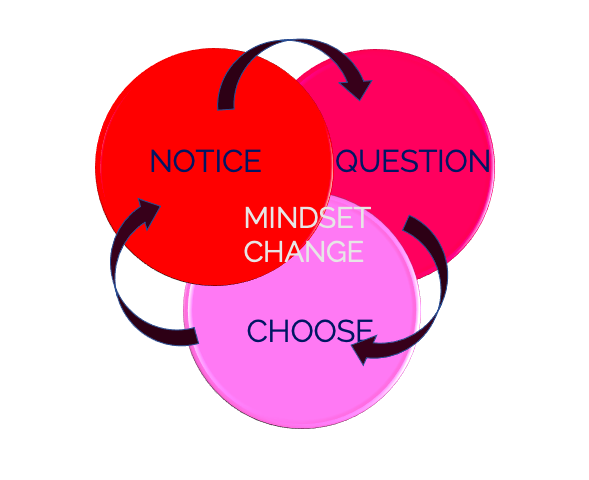When we’re oblivious to our mindsets, we are at the mercy of our reactions. That’s not a good way to live or lead.
Last week we looked how noticing our mindset helps us choose the way we want to lead and show up. If you missed it you can read about it here.
In that blog I shared this model I use myself and in my work. It’s simple – but devilishly effective!
There are layers to how it works.
Noticing isn’t just about catching your mindset in the moment, to then be able to question and choose a more empowering one.
Notice helps in others ways, like setting yourself up ahead of time to ensure the meetings or conversations you’ll be having go as powerfully as possible. Especially those ones where you fear you might get derailed.
Imagine you have a big sales meeting coming up. Ahead of time, think to yourself, okay, what am I noticing about my mindset with this meeting? You might notice ‘I’m really feeling quite anxious, quite nervous about it.’ Cool.
Then, get curious about that. Question it.
You might ask ‘okay, is this actual fear and anxiety I’m feeling? Or is it a form of suppressed excitement?’ You might then see that actually, you’re excited about this meeting and you’re ready – you’ve got this. You can then choose to go in confident and empowered, ready for the conversation.
In questioning, you might really feel anxious about the meeting. Nervous. Maybe even dread? And that’s fine too. Start to question what’s underneath that anxiety. What are you anxious about?
“My boss is gonna be there. I don’t want them to think I’m stupid.”
“I really need this sale. Things are tight”
Sometimes that is enough to then choose a new mindset. You realise that you’re not stupid, this is an old fear, and you can choose to go into the meeting with confidence. Or, in noticing your attachment and whiff of desperation you are bringing to the meeting (example 2), you dial it down and go in freer and in service to them.
Noticing our mindsets is a skill we must master as leaders. It takes practice to untangle them from the stories we tell and the assumption we make.
Notice what you’re thinking, feeling and assuming about a situation.
Question whether this is even true. Is there another way you could see it?
Choose the mindset that will most serve you in this situation. Is it being curious? Being confident that you’ve got this?





